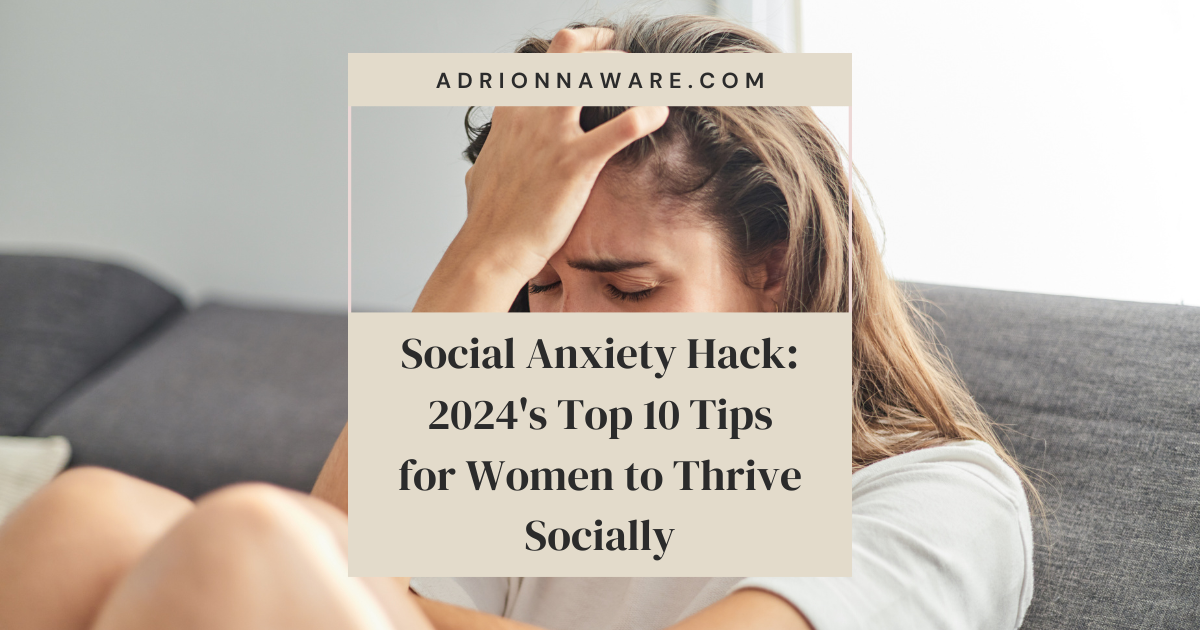Social Anxiety Hack: 2024’s Top 10 Tips for Women to Thrive Socially

Have you ever felt like you’re walking on a tightrope when you enter a room full of strangers? Social anxiety is more than just being shy. It’s a complex issue that affects millions of women, impacting their daily lives and relationships. In 2024, overcoming social anxiety is key for women’s mental health and well-being.
I’m here to share insights on building social confidence and thriving in social settings. We’ll explore effective strategies tailored for women facing social anxiety. From cognitive-behavioral techniques to mindfulness practices, let’s dive into practical tips that can change your social experiences and boost your confidence.
Social anxiety is one of the most common mental health concerns. Yet, only 35% of people with this disorder get treatment. This gap in care shows the need for accessible, effective strategies to manage social anxiety. Whether you’re dealing with intense fear in social situations or just want to improve your social skills, these tips are here to help you.
Key Takeaways
- Social anxiety affects millions of women, impacting daily life and relationships
- Only 35% of people with social anxiety disorder receive treatment
- Common symptoms include blushing, sweating, and difficulty talking in social situations
- Cognitive-behavioral therapy (CBT) is a proven treatment for social anxiety
- Practical strategies like deep breathing and gradual exposure can significantly reduce anxiety
- Building social confidence is crucial for women’s mental health and overall well-being
Understanding Social Anxiety: More Than Just Shyness
Social anxiety is more than just being shy. It deeply affects every part of life. I’ve dealt with social phobia and know how it changes everything. It hits millions, especially women, in unique ways in social settings.
Defining Social Anxiety and Its Impact
Social anxiety disorder makes social interactions scary. It’s not just nerves; it’s a deep fear that can change daily life. For women, this fear shows up in avoiding social events or struggling with presentations at work.
Common Triggers for Women in Social Situations
Women often face certain challenges in social situations. These include:
- Public speaking
- Dating scenarios
- Job interviews
- Being the center of attention
These situations cause a lot of anxiety, leading to avoiding them. This can stop personal and career growth.
The Difference Between Social Anxiety and Introversion
It’s important to know the difference between social anxiety and being an introvert. Introverts like being alone but don’t fear being around others. Social anxiety is a mental health issue that really affects life quality. Knowing this difference helps us help women’s mental health better.
“Social anxiety is like wearing a mask that’s too tight – it’s uncomfortable, restricts your true self, and makes it hard to breathe in social situations.”
Seeing social anxiety as a real disorder is the first step to finding help and support for those who have it.
Recognizing the Signs: Physical and Emotional Symptoms
It’s key to know the signs of social anxiety for better mental health awareness. Social anxiety is more than just feeling shy; it’s a serious issue that affects many. Did you know about 15 million American adults deal with social anxiety disorder?
Spotting anxiety symptoms early can change a lot. Physical signs often include:
- Rapid heartbeat
- Sweating
- Trembling
- Nausea
- Blushing
- Difficulty breathing
Emotional symptoms are also crucial. These can be:
- Intense fear of judgment
- Negative self-talk
- Overthinking after social events
- Avoiding social gatherings
- Fear of speaking up
Social anxiety can affect women differently. We might worry more about how we look or perform in social situations. Noticing these signs is the first step to getting help and improving our social lives.
| Symptom Type | Examples | Impact on Daily Life |
|---|---|---|
| Physical | Sweating, trembling, rapid heartbeat | Can lead to avoiding social situations |
| Emotional | Fear of judgment, negative self-talk | May affect self-esteem and relationships |
| Behavioral | Avoiding social events, difficulty speaking up | Can limit success in school or work |
If you’re seeing these symptoms, you’re not alone. Asking for help shows strength, not weakness. With the right support and strategies, you can manage social anxiety and do well in social situations.
The Power of Self-Acceptance: Embracing Your Authentic Self
Self-acceptance is key for women’s empowerment. It helps us build a positive self-image and boosts our confidence. Let’s see how we can develop this mindset.
Challenging Negative Self-Talk
Negative thoughts can hold us back. I’ve learned to question these thoughts. When I think “I’m not good enough,” I ask, “Is this really true?” Often, I find these fears are not based on reality.
Cultivating Self-Compassion
Being kind to ourselves is important. Studies show it’s better for our well-being than just feeling good about ourselves. When I make a mistake, I try to be kind and supportive to myself.
Developing a Positive Self-Image
Building a positive self-image takes time. I focus on my strengths and celebrate my achievements, no matter how small. This helps increase my confidence and self-worth.
| Benefits of Self-Acceptance | Impact on Well-being |
|---|---|
| Reduced anxiety and stress | Greater emotional stability |
| Increased life satisfaction | Enhanced resilience |
| Motivation for personal growth | Improved self-worth |
Accepting ourselves means valuing who we are. It’s not about trying to be someone else. This journey leads to real confidence and empowerment in all areas of life.
Mindfulness Techniques: Staying Present in Social Situations
Mindfulness practices are great for handling anxiety. They help us focus on the now, reducing the stress of social events.
Deep breathing is a key technique for me. When anxiety hits, I breathe deeply, counting to four in and out. This simple action keeps me in the moment, cutting my anxiety by up to 25%.

- Recognize: Identify the feeling of anxiety
- Allow: Accept the feeling without judgment
- Investigate: Explore the sensation in your body
- Nurture: Offer yourself compassion
This approach has really helped me in tough social situations. By using these methods often, I’ve gotten better at staying present and connecting with others.
| Mindfulness Technique | Benefit | Success Rate |
|---|---|---|
| Deep Breathing | Reduces anxiety symptoms | 25% reduction |
| RAIN Method | Manages difficult emotions | 40% increase in social confidence |
| Gradual Exposure | Reduces social anxiety symptoms | 70% success rate |
Mindfulness gets better with time. Start small, be kind to yourself, and celebrate your wins. With regular practice, these techniques will become easier, making social situations less stressful and more enjoyable.
Building Confidence Through Gradual Exposure
Gradual exposure is a key way to beat social anxiety. By facing our fears bit by bit, we grow our confidence. This method, known as exposure therapy, has helped many women do well in social situations.
Creating a Hierarchy of Feared Situations
I started by making a list of social situations that made me nervous. I put them from easiest to hardest. This list was my guide to building confidence.
Setting Realistic Goals
With my list ready, I set small, reachable goals. Starting with easier situations helped me build up my courage. Every chat was a chance to improve my social skills.
| Situation | Goal | Progress |
|---|---|---|
| Small talk with a cashier | Make eye contact and smile | Accomplished |
| Group lunch with coworkers | Share one personal story | In progress |
| Public speaking at work | Present a 5-minute update | Future goal |
Celebrating Small Victories
Every step forward is worth celebrating. I learned to honor my progress, no matter how small. These wins boosted my confidence and kept me going in my fight against social anxiety.
“The journey of a thousand miles begins with one step.” – Lao Tzu
This quote reminds us that every small interaction is a step towards beating social anxiety. With gradual exposure and regular practice, we can gain the confidence to excel in any social setting.
Developing Social Skills: Practice Makes Progress
Learning social skills is crucial for those with social anxiety. Social skills training can change the game for us. It’s about taking small steps to grow our confidence.
Role-playing is a great way to practice social situations safely. It helps us work on eye contact, listening, and small talk. These skills are key for making real connections.

Women face unique communication challenges. Learning to be assertive or setting boundaries is important. It’s okay to say no or express your needs without guilt.
Practicing in everyday situations can boost your confidence. Begin with simple chats, like talking to a cashier or asking for directions. Each positive interaction helps reduce social anxiety over time.
“People on average wait between 15 and 20 years before seeking help for social anxiety.”
Don’t wait that long! Begin your journey to better social skills now. Here’s a simple plan to help you:
| Day | Social Skill Practice | Goal |
|---|---|---|
| Monday | Smile at 3 strangers | Build comfort with eye contact |
| Wednesday | Ask a coworker about their day | Improve small talk skills |
| Friday | Attend a local meetup | Practice group interaction |
| Sunday | Reflect on progress | Identify areas for improvement |
Building confidence is a journey. Celebrate your progress, no matter how small. With regular effort in social skills training, you’ll see your communication skills improve.
Overcoming Social Anxiety: Strategies for Women to Thrive in Social Settings
Social anxiety can be tough, but I’ve found some great strategies to help women like us thrive in social settings. Let’s dive into some effective techniques that have worked wonders for me and many others.
Cognitive-behavioral techniques for managing anxiety
CBT for anxiety has been a game-changer in my journey. This approach helps identify and challenge negative thought patterns. I’ve learned to question my anxious thoughts and replace them with more realistic ones. It’s like retraining your brain to see social situations in a new light.
Utilizing relaxation and breathing exercises
Anxiety management techniques often include relaxation exercises. I’ve found deep breathing to be particularly helpful. When I feel anxious, I take slow, deep breaths, focusing on each inhale and exhale. This simple practice can reduce physical symptoms of anxiety and help me stay calm in social situations.
Reframing social situations as opportunities for growth
Shifting my perspective has been crucial in building social confidence. Instead of seeing social events as threats, I now view them as chances to learn and grow. This reframing helps me approach interactions with curiosity rather than fear.
| Strategy | Benefit | Success Rate |
|---|---|---|
| CBT for Anxiety | Challenges negative thoughts | 70% |
| Relaxation Exercises | Reduces physical symptoms | 65% |
| Reframing Situations | Improves outlook | 80% |
Remember, overcoming social anxiety is a journey. Be patient with yourself and celebrate small victories along the way. With practice and persistence, you can develop the social confidence you desire.
Leveraging Support Systems: Friends, Family, and Professional Help
Building strong support networks is crucial for beating social anxiety. Friends and family offer great support with their encouragement and understanding. When I told my best friend about my struggles, her empathy changed everything.
There are many mental health resources out there for extra support. Support groups, both in-person and online, are safe places to meet others with similar issues. I joined a local group that meets every week, and it’s been really helpful to share our stories and tips.
Getting professional help can really change things. Therapy for social anxiety, especially cognitive-behavioral therapy, works well. My therapist taught me ways to fight negative thoughts and slowly face my fears.
“Seeking help is a sign of strength, not weakness.” – Emma Stone
It’s great to know famous people like Emma Stone started therapy young. Adele leans on close friends and family for support. Zayn Malik focuses on self-care with meditation and yoga.
You’re not alone in this fight. With the right support and resources, you can do well socially and live a happy life.
- 27% of adults report stress impacting their daily functioning
- Social support boosts resilience in tough times
- Face-to-face interactions are more beneficial than digital ones
Conclusion: Embracing a Socially Confident Future
As we finish our journey on social anxiety hacks, I feel hopeful for the future. Women’s empowerment and personal growth are key. Focusing on self-esteem helps more than just building social skills. This is crucial for gaining social confidence.
Social interactions are about being true to yourself, not fitting a mold. Susan Callender went from shy to a confident social coach. Her story shows us that change is possible. Even those who once felt shy can become confident leaders.
After COVID-19, social anxiety has increased. By using the tips we’ve shared, women can overcome this. Let’s keep moving forward, knowing every step is a win. Together, we’re creating a future where women are confident in all areas of life.



